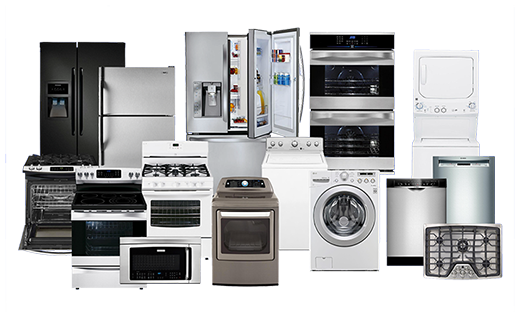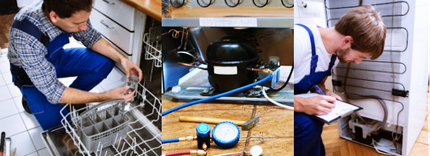Appliance Repair Toolkit – Dryer repair Oro Valley Dependable Refrigeration & Appliance Repair Service
Appliance Repair Toolkit – Dryer repair Oro Valley Dependable Refrigeration & Appliance Repair Service
Blog Article
The Ultimate Guide to Comprehending Appliance Repair Service in the house
When your fridge stops cooling or your oven declines to warmth, it can really feel frustrating. Understanding appliance repair in your home can conserve you money and time. You'll find out to identify signs and symptoms, use necessary tools, and comply with a methodical troubleshooting process. Prior to you begin, there are critical safety and security preventative measures you require to take right into account. What are the most typical problems, and just how can you fix them? Let's explore the basics.
Typical Device Issues and Their Signs and symptoms
When your appliances begin breaking down, it's important to recognize the signs at an early stage. Disregarding them can lead to larger issues and expensive fixings. As an example, if your fridge isn't cooling correctly, you might see cozy spots or condensation developing. This might indicate a falling short compressor or an obstructed vent.Your dish washer may reveal issues through dirty meals or uncommon sounds during cycles. If you hear grinding or clanking, it's time to investigate.A cleaning maker that won't rotate or drain can leave you with soaked laundry, suggesting a blocked drainpipe or a malfunctioning pump.Lastly, if your oven's temperature level seems off or it takes forever to preheat, you might be managing a faulty thermostat. By remaining sharp to these signs, you can deal with issues prior to they escalate right into significant repair services.
Important Tools for Device Fixing
When you're dealing with home appliance repair services in the house, having the right tools is necessary. Basic hand devices like screwdrivers and pliers will certainly aid you dismantle and fix various appliances, while electrical testing tools ensure you're functioning safely with circuitry. Allow's discuss what you need to get started on your repair journey.
Standard Hand Devices
Having the right tools is essential for effective appliance fixing in the house. Begin with a reliable screwdriver collection, consisting of both flathead and Phillips types, as screws prevail in home appliance assembly. Pliers are additionally important; they assist with gripping, turning, and reducing wires or small parts. A set of needle-nose pliers can get to difficult situations conveniently. You'll need a great flexible wrench for tightening or loosening up nuts and bolts. An utility blade is helpful for puncturing product packaging or insulation. Do not fail to remember a sturdy workbench or surface area to safely arrange your devices and components. With these fundamental hand tools, you'll be well-prepared to deal with most appliance repairs that come your method.
Electrical Screening Devices
Along with fundamental hand devices, electrical screening devices play an important duty in appliance repair. These devices help you identify electric issues and warranty appliances operate securely. A multimeter is vital; it determines voltage, present, and resistance, enabling you to pinpoint problems rapidly. A non-contact voltage tester is one more essential, letting you detect real-time cables without making straight get in touch with, improving your security. Clamp meters are terrific for measuring existing circulation in wires without disconnecting them, saving you effort and time. In addition, circuit testers can swiftly check if outlets are working correctly. By utilizing these tools, you'll streamline your troubleshooting process and boost your fixing skills, making home appliance upkeep a whole lot less complicated.
Step-by-Step Guide to Diagnosing Appliance Issues
When your appliance breaks down, it can be aggravating, yet detecting the concern doesn't have to be overwhelming. You'll learn to identify common issues and apply efficient repairing strategies. Let's go through the steps to get your device back in working order.
Common Device Troubles

Troubleshooting Strategies Described

Repairing Major Cooking Area Home Appliances: A Closer Look
Have you ever before questioned how to deal with usual problems with your kitchen devices? Repairing major cooking area home appliances like refrigerators, stoves, and dishwashers can be easier than you assume. Start by recognizing the problem-- whether it's a refrigerator not cooling or a stove that won't heat. Usually, a basic reset or checking the source of power can resolve the issue.For fridges, clean the condenser coils and examine the door seals. If your oven's not heating, inspect the home heating component and thermostat. Dishwashing machines could just require a clean filter or a reset to obtain them back in action. Constantly disconnect the device before diving into fixings to ensure your safety.Don' t neglect to seek advice from the customer handbook for details troubleshooting ideas associated with your model. With a little bit of perseverance and the right tools, you can confidently deal with device repairs and save money at the same time!

Repairing Laundry Devices: Tips and Techniques
When your washing appliances begin acting up, it can really feel overwhelming, but repairing them does not need to be an inconvenience. Start by checking the power supply. Verify the home appliance is plugged in and the electrical outlet is functioning. Next, inspect the door or cover switch; a faulty button can avoid the machine from operating.For washers, if it's not rotating, inspect for out of balance tons. Redistributing the clothing may resolve the problem. If your dryer isn't home heating, tidy the lint filter and check the vent for blockages.Listen for uncommon noises; they can show a trouble. If your home appliance is dripping, check the tubes for splits or loose links. Document any mistake codes presented on digital screens, as they can direct you in recognizing the issue. Consult the customer handbook for particular fixing suggestions related to your version.
Safety And Security Preventative Measures to Take Throughout Services
Before you start any kind of home appliance repairs, it's vital to prioritize safety and security to avoid accidents or injuries. Initially, unplug the home appliance or shut off the circuit breaker to ensure no power reaches it while you function. Use protected devices to minimize the threat of electric shock. Use safety goggles and handwear covers to safeguard on find out this here your own from sharp sides or debris (Washer dryer repair service Dependable Refrigeration).Make specific your work space is neat and well-lit, so you can see what you're doing. Maintain children and pets far from the area to avoid distractions and possible hazards. If you're managing gas home appliances, be added careful; look for leakages prior to proceeding.Take your time, and do not hurry via repair services. If you really feel uncertain concerning any kind of step, it's much better to stop briefly and research study than to think. Adhering to these precautions will assist produce a more secure atmosphere for your DIY home appliance repair service project
When to Call an Expert for Aid
How do you understand if it's time to employ a specialist for device repair work? If you've attempted standard troubleshooting without success, it's a clear sign. If your home appliance still will not begin or reveals unusual noises after resetting it, do not be reluctant to look for specialist help.When you discover leakages, smoke, or burning smells, focus on security and call a professional instantly. These issues can cause more significant damages or position risks to your home.Also, if your home appliance is under service warranty, contacting an expert is usually the most effective course. They can ensure that repair work won't void your service warranty, conserving you cash in the long run.Finally, if you're unclear or uneasy with complex repairs, it's important to leave it to the experts. Bear in mind, taking on complex concerns without the right knowledge can cause pricey errors. Count on a specialist when in question!
Often Asked Questions
Just How Can I Stop Home Appliance Problems in the Future?
To stop appliance problems in the future, you ought to do normal maintenance, check for wear and tear, tidy filters, and prevent overloading. Remaining aggressive will assist expand their lifespan and keep them running smoothly.
What Are one of the most Usual DIY Device Repair Work Mistakes?
You could forget security precautions, skip repairing steps, or use incorrect tools when trying DIY device repairs. Rushing the procedure or disregarding supplier guidelines can lead to even more considerable problems and expensive errors. Keep client and notified!
How Do I Know if a Part Requirements Replacement?
You can tell if a component requires replacement by looking for uncommon noises, leaks, or irregular efficiency. If the appliance has a hard time to operate properly or shows visible damage, it's likely time for a substitute.
Can I Make Use Of Generic Components for Device Services?
Yes, you can utilize common parts for appliance fixings, however determine they work - Kenmore Dryer Repair Oro Valley Dependable Refrigeration & Appliance Repair Service. Common components may conserve you cash, yet they could impact performance or durability, so microwave oven repair service weigh your choices meticulously before deciding
What Service Warranties Cover Appliance Repairs?
Most home appliance service warranties cover repair work for producing problems, however they frequently omit damage from abuse. Inspect your guarantee terms meticulously, as some may require using certified technicians and initial components for coverage to continue to be legitimate.
Report this page